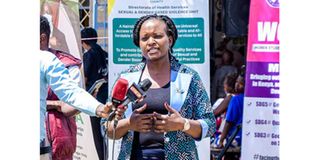A letter to Chiggai, President's women’s rights advisor

Harriette Chiggai, the President’s Advisor on Women’s Rights.
What you need to know:
- One, many women are brutalised by intimate partners, maimed and rendered total dependants.
- These women spend long periods of hospitalisation, a huge economic cost.
Madame,
I hope you have settled into your new office. You will remember that during the 16 Days of Activism Against Gender-based Violence (GBV) last year, the mass media featured many stories on the subject.
Knowing that you may have been too busy to read them, I have opted to give you a summary, hoping that this may help in advising the government.
One, many women are brutalised by intimate partners, maimed and rendered total dependants. These women spend long periods of hospitalisation, a huge economic cost.
Don’t you think it would be helpful to have perpetrators financially compensate them? Perhaps you want to check whether the Victim Protection Act (2014) is being implemented with regard to this.
Two, GBV victims face serious obstacles accessing justice. These include high litigation costs, bureaucracy, delayed hearings, family interference, intimidation, reliance on complicit traditional dispute resolution mechanisms and corruption.
Maybe you can check whether there is a statutory legal aid scheme, and if it is non-existent, advise that one be established. Do also have a chat with the Judiciary on how GBV cases can be expedited through the general and special GBV courts.
Three, teenage pregnancy has reached exponential levels in Kenya. I am not sure whether you find it flattering that our country holds the third position globally on this matter.
Maybe you do not consider this to be GBV. But it is. And even as we implement the re-entry policy into school for affected girls, do you not think we are encouraging permissiveness that we may never escape from? Do you not think we should have a preventive strategy of zero teenage pregnancy?
While at it, the World Aids Day report 2022 says that out of 10 sexually assaulted children, eight are girls violated by relatives. It might help to know that incest is often muzzled at the family level, hence hardly reach courts of law. Do you think this issue falls under your office, or would you rather leave it to the family?
Four, Kenya has a number of laws that address GBV. Does it bother you that even with these laws, the scourge continues unabated?
For your reference, the World Aids Day report 2022 indicates that GBV cases doubled from 19,839 in 2020 to 38,842 in 2021. Where do you think is the problem? I wonder what multi-dimensional strategies you have in mind to eliminate this vice.
Five, former President Uhuru Kenyatta declared that Kenya would eradicate female genital mutilation by the end of 2022. You could let us know whether this has happened.
While at it, please, have the courage to advise the current President against setting populist political deadlines on such matters without understanding their root causes. Such declarations only drive the practice underground.
Maybe you could engage sociologists, anthropologists and behaviour change experts in tackling the matter. Perhaps you also want to evaluate the counter-strategies that have been employed to establish their levels of success.
I hope you also know that there are many theses on this subject gathering dust in our universities. Reading them will not harm but probably generate a few ideas you can share with the government.
Six, most shelters for GBV survivors are private entities that are chronically short of resources and are unevenly distributed. I wonder whether you want to establish an inventory of these services.
The Centre for Domestic Training and Development could be of help. Perhaps you also want to stratify best practice and use it to come up with a model that is replicable nationwide.
Seven, there are cultural forms of sexual exploitation of women fish traders in the name of kutoa mambwe in coastal communities and jaboya in Lake Victoria areas. The consequences are obvious – sexually transmitted infections, pregnancies and marital conflicts.
A recent study has also unveiled a vice called reproductive coercion where husbands brutalise their wives for using contraceptives secretly and force them into intercourse. Prevalence in Kenya stands at 7.8 per cent. Is there anything you can do about this?
Eight, there is the small matter of female Kenyan migrant workers being routinely violated in the Middle East. Do you think this is something your office can intervene on or is this purely for the ministries of Foreign Affairs and Labour?
Nine, many men have become activists against GBV. This movement was founded on a basic argument; that men are the majority perpetrators of violence, hence must be part of the solution.
Do you think there is anything you can do to get majority men into this movement, starting with the one you report to? Kindly remember that boys and men are also victims of GBV. I look forward to reading your performance report.
Dr Miruka is an international gender and development consultant and scholar ([email protected])





